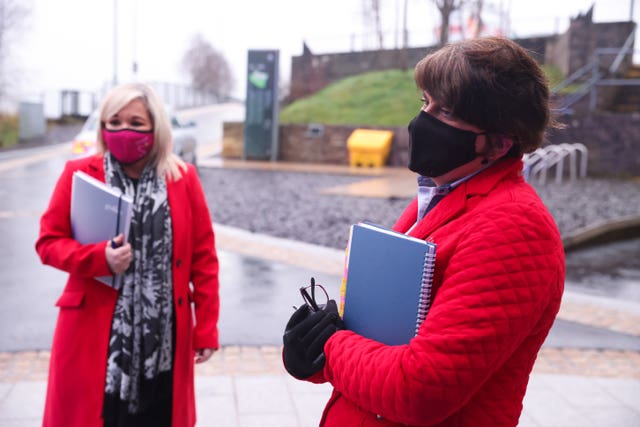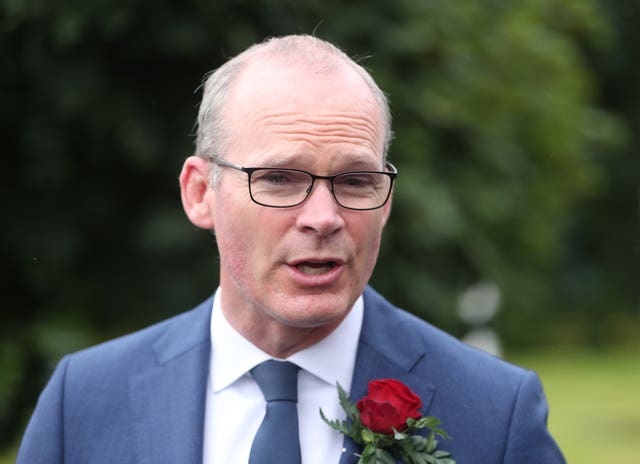The UK and EU are set for crunch talks with Northern Ireland’s leaders over mounting tensions around post-Brexit Irish Sea trading arrangements.
Cabinet Office minister Michael Gove and European Commission vice president Maros Sefcovic will hold a virtual meeting with First Minister Arlene Foster and Deputy First Minister Michelle O’Neill to discuss the ongoing furore over the Northern Ireland Protocol.
Mrs Foster and senior DUP colleagues will hold a separate virtual call with Prime Minister Boris Johnson on Wednesday morning ahead of the early evening engagement with Mr Gove and Mr Sefcovic.
Physical inspections on goods entering the region from Great Britain, which are required under the protocol, have been suspended amid threats and intimidation of staff.
Police have insisted there is no evidence that loyalist paramilitaries are involved in the sinister campaign, instead blaming disgruntled individuals and small groups.

On Tuesday, in another sign of heightened tensions in the region, a large group of masked men were seen walking around an area of east Belfast where the Ulster Volunteer Force exerts influence on the community.
Graffiti warning off inspectors has appeared close to ports in recent weeks.
Police have stepped up patrols at the ports following the spate of intimidatory incidents.
Mr Gove and Mr Sefcovic chair the UK/EU joint committee tasked with implementation of the protocol.
The meeting comes after Mr Johnson said “urgent action” is needed to resolve outstanding problems.
The protocol is a mechanism agreed by the UK and EU as part of the withdrawal talks to ensure a free-flowing Irish border.
It achieves that by moving regulatory and customs processes to the Irish Sea, focusing on the movement of goods between Great Britain and Northern Ireland.
The inspections and added bureaucracy are required because, under the protocol, Northern Ireland remains in the EU single market for goods and also applies EU customs rules at its ports.
Unionists and loyalists are deeply unhappy with the new arrangements, which came into force on December 31, believing the protocol has created a barrier between the region and the rest of the UK, undermining the constitutional integrity of the Union.
On Tuesday, the DUP announced a series of political moves aimed at undermining the protocol.
Its strategy includes opposing any protocol-related legislation at the Stormont Assembly and refusing to participate in any exchanges with the Irish Government related to the operation of the protocol.
Ireland’s foreign minister Simon Coveney said issues over the protocol would not be solved by cutting relationships.
“I recognise that there are serious issues that need to be resolved, we need to work on that with the commission today and with leaders in Northern Ireland,” he told BBC Radio Four.
“But this isn’t going to be solved by cutting off relationships or trying to throw away the entire protocol, without any credible proposals as to what you replace it with.
“The protocol is only a month old. It’s part of an international agreement between the UK and the EU.
“We all have legal obligations in terms of its implementation and so the focus now needs to be on a calm, but firm, discussion around how we make the protocol more acceptable in the context of its implementation, where there are real problems.”

Tensions have been heightened following the controversial events of last Friday when the European Commission was forced to backtrack on a threat to suspend part of the protocol.
The botched move by the EU would have struck at the heart of the protocol’s main function – to facilitate a free-flowing Irish border – by placing restrictions on vaccines moving into Northern Ireland from the bloc.
While the EU stepped back from the brink, after an evening of frantic diplomacy, the episode further angered loyalists and unionists and emboldened them to press their demands for an end to the protocol.




Comments: Our rules
We want our comments to be a lively and valuable part of our community - a place where readers can debate and engage with the most important local issues. The ability to comment on our stories is a privilege, not a right, however, and that privilege may be withdrawn if it is abused or misused.
Please report any comments that break our rules.
Read the rules hereLast Updated:
Report this comment Cancel